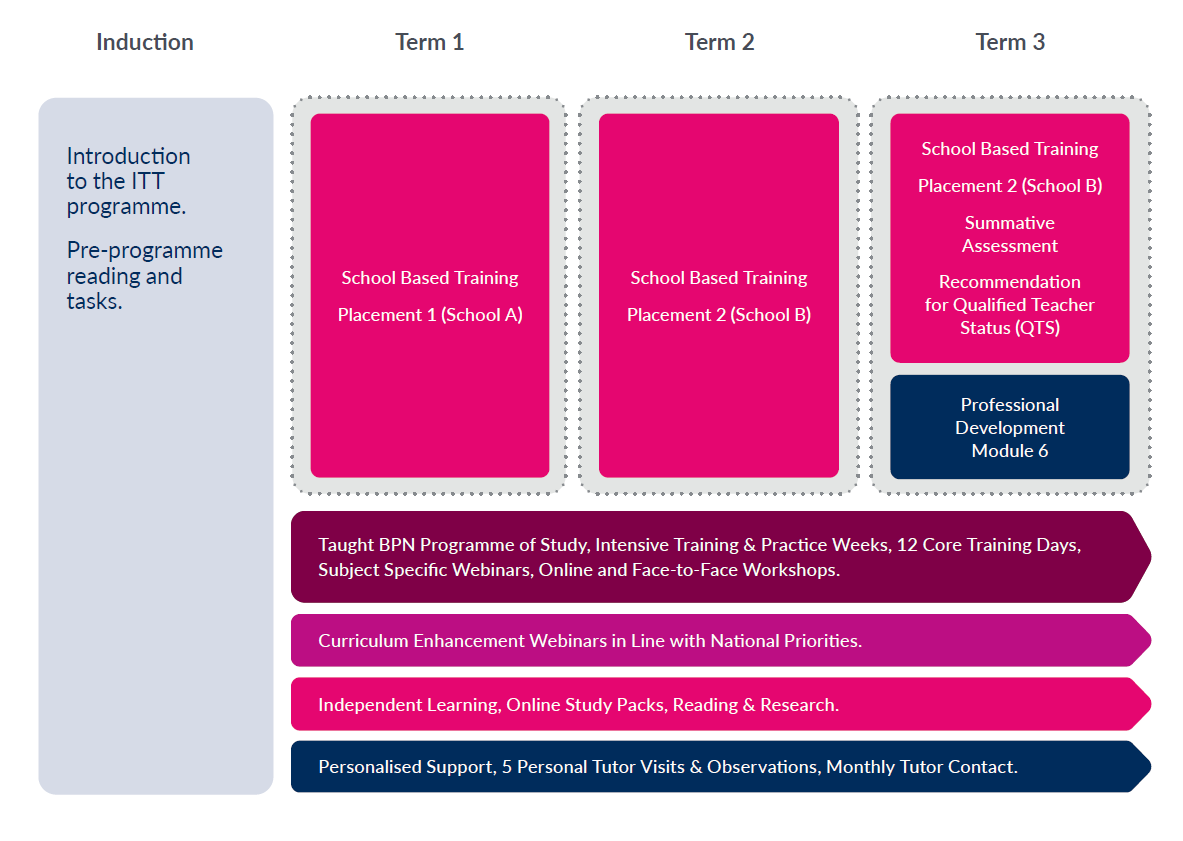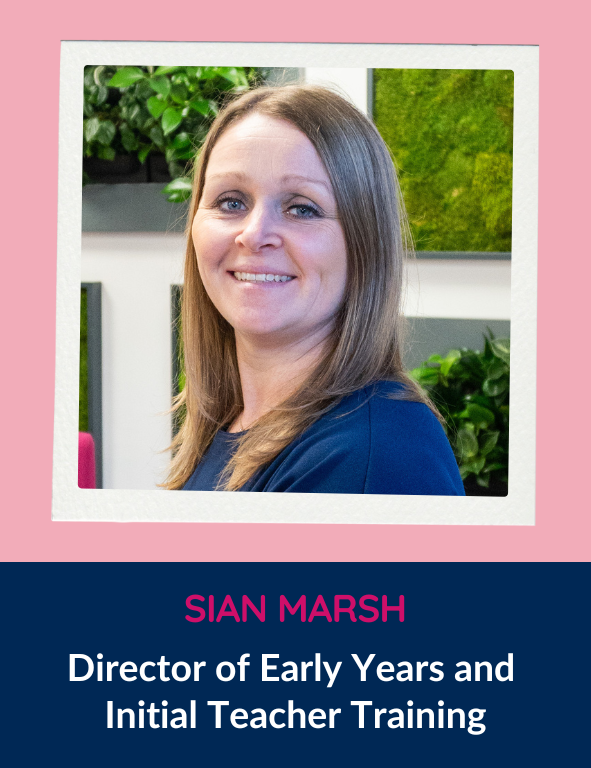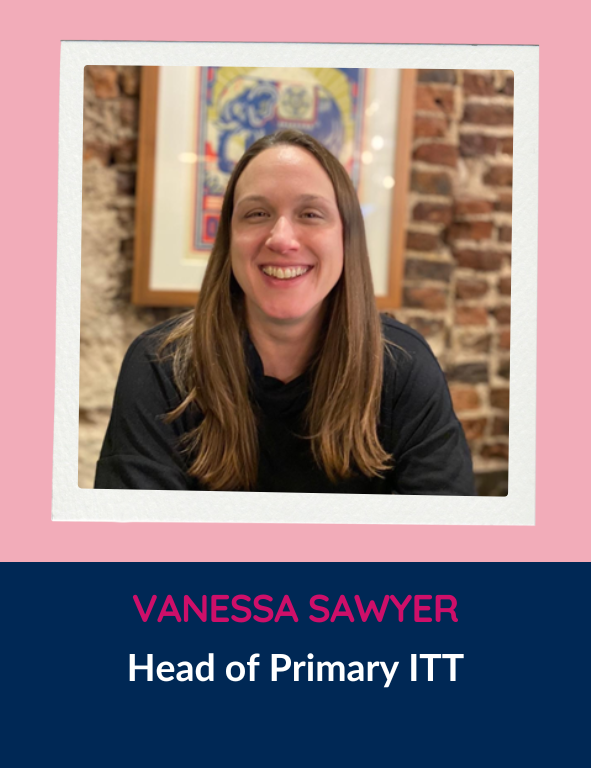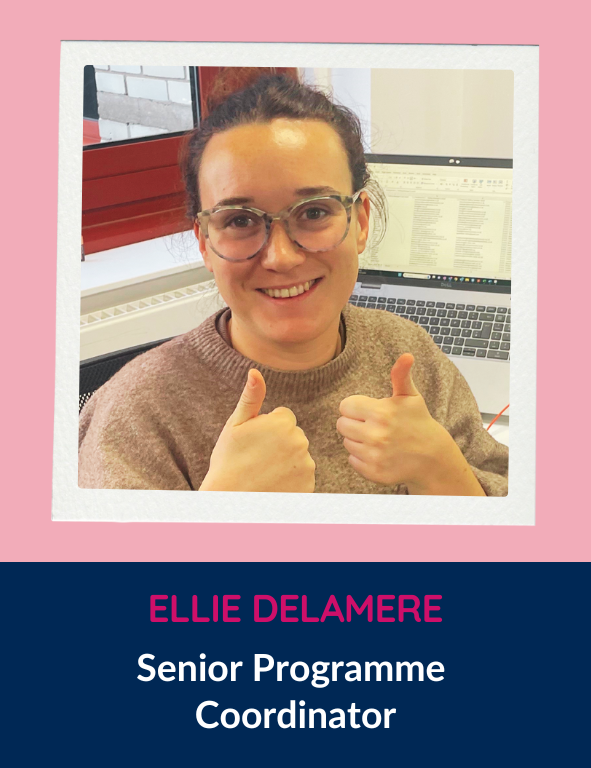.png)
Why become an English teacher?
As an English teacher, you’ll play a vital role in supporting students to develop the communication skills they need to succeed in all areas of life.
Make a real difference: You'll equip students with the communication skills they need to thrive in all areas of life. Whether it's developing their own voice, finding the literature they love, or guiding them to tackle their exams with confidence.
Ignite a love for learning: Open the door to endless possibilities. Inspire a passion for reading, writing, and critical thinking that will shape your students’ futures.
Be creative in the classroom: Bring English to life with exciting lessons. Whether it’s drama, debates, or storytelling, you’ll spark curiosity and make every class unforgettable.
Which teacher training route is right for me?
We offer two routes to Qualified Teacher Status (QTS):
- The Postgraduate Teacher Apprenticeship – ideal for those already working in schools
- Fee-Funded Initial Teacher Training (ITT) – best for those not currently employed by a school
Whichever route you choose, you’ll receive expert support, school-based training and a nationally recognised qualification. Not sure which route is right for you? There is more guidance below:
English Teacher Training Comparison Table
Use the table below to compare the key features of our Fee-Funded Initial Teacher Training and Teacher Apprenticeship programmes at a glance.
📱 On mobile? Swipe sideways to see the full table →
Can I train to teach English part-time?
Yes! We offer flexible part-time English teacher training with QTS for those who need to balance teacher training with work, family or other commitments.
It follows the same high-quality curriculum and leads to the same qualification as the full-time route, but is delivered over two years.
How will I train to become an English teacher?
Our curriculum is designed to build your skills and confidence progressively, blending theory with hands-on classroom experience.
You’ll complete two school placements across the year, supported by a personal mentor and subject specialists throughout your journey.
Your training will include:
- 10 Core Training Days – online or Face-to-Face, carefully designed to teach the core body of skills that define great teaching.
- 4 Intensive Training and Practice (ITAP) Weeks – see expert teaching in action and apply new strategies in your own lessons.
- 10 subject specific training sessions - led by your subject lead and will equip you with the skills required to teach English across the 11-16 age phase.
Core learning areas:
- Behaviour Support & Classroom Management
- Curriculum Delivery
- Teacher Development
By the end of your programme, you’ll be ready to teach up to 80% of a full timetable and demonstrate the skills required for Qualified Teacher Status (QTS).
Upon completion of your practical training, you will...
- Present your portfolio and demonstrate your readiness to be awarded Qualified Teacher Status (QTS).
- (For Apprenticeship route only) complete your Apprenticeship Assessment, which includes a lesson observation and a professional discussion with an external examiner—giving you the opportunity to achieve a distinction-level award.

- Induction: you will have your first day of learning and ITT Induction before the start of your training to help you prepare for the programme
- Term 1: You will be in your host school this term. Training in school four days a week and attending online or in-person training one day a week
- Term 2: you will spend 6 weeks in a contrasting school placement.
- Term 3: You will return to your host school to prepare for the recommendation of QTS
- Term 4 (Apprenticeship only): Assessment for Level 6 Teacher Apprenticeship Qualification, where you can reach distinction level in addition to your QTS!
Hear what our student teachers have to say...
Why choose Best Practice Network for your teacher training?
- Ofsted outstanding: provider of the DfE’s full teacher progression pathway, supporting student teachers from entry into teaching through to executive leadership.
- 20+ years of experience: Delivering teacher training and professional qualifications for teachers, school leaders, support staff and early years professionals.
- Subject & phase specific groups: As a leading national provider our enrolment enables student teachers to train alongside peers specific to their phase, subject and specialism.
- Local placement: Our network of 500+ schools provides our student teachers local access to in-school placements.
- Supporting wellbeing: Our pathway is QTS-only helping support student teacher capacity and wellbeing on their journey into teaching.
- Award-winning: Best Practice Network has been named Education Apprenticeship Training Provider of the Year (twice!)
- 90% of our 2023/24 graduate teachers have secured employment for September
.png)
What qualifications do I need to train to be an English teacher?
To be eligible for our teacher training, applicants MUST hold:
- A bachelor’s degree (or equivalent) with a 2:2 or above
- GCSE grade 4/C* or above in English and maths (or recognised equivalent*)
- While school experience is not mandatory, we highly recommend it as a valuable way to confirm your interest in a teaching career
*Qualifications in key and functional skills at level 2 are not equivalent to GCSEs in terms of breadth of content.
"I do not work in a school" - Apply Here
Whether you're a career changer or about to graduate from university, our fee-funded Initial Teacher Training route is a great way to gain Qualified Teacher Status (QTS) in under a year. You’ll train in a school four days a week, with one day of expert-led training either online or face to face — all organised for you by Best Practice Network.
Starting in September, this 11-month course can be funded through a student loan or self-funding. It’s a flexible and supportive route into teaching for those ready to launch a rewarding new career.
Choose from one of two age ranges for our fee-funded Initial Teacher Training:
| Specialism | Age Range | Start dates |
| English | 11-16 | September 2026 |
Apply now for the next intake!
Congratulations! You appear to be eligible to apply. Please click the link below to begin your application
Apply for Biology Apply for Chemistry Apply for Computing Apply for English Apply for French and German
Apply for French Apply for Geography Apply for Maths Apply for Spanish Apply for Spanish and German Apply for Spanish and French
To apply, you must have lived in the UK for the last 3 consecutive years.
Question 1: Have you lived in the UK for at least the last 3 consecutive years?
To apply, you must have have the right to work and study in the UK.
Question 2: Do you have the right to work and study in the UK?
To join this programme, you must have one of the following:
-
GCSEs in English, maths and science at Grade 4 (C) or above
-
Equivalency tests for English, maths and science at GCSE level
-
International qualifications equivalent to GCSE English, maths and science as assessed by UK ENIC (comparability Statement)
Question 3: Do you hold these GCSEs or equivalent qualifications?
To join this programme, you must hold a bachelor’s degree (or equivalent) in any subject, awarded at a minimum classification of 2:2.
Question 4: Do you have a bachelor's degree awarded at a minimum classification of 2:2?
"I currently work in a school" - Apply Here
If you are currently employed in a school, the Postgraduate Teacher Apprenticeship is an ideal pathway to achieve Qualified Teacher Status and a Level 6 Teacher Apprenticeship in just 10 months + Assessment.
All training costs are covered by your placement school’s Apprenticeship Levy, so there are no fees to pay.
During your apprenticeship, you will be employed at a school and receive a salary of between £21k-£27k per year on the Unqualified Teacher Salary (UNQ1) and upon qualification, you’ll step straight into a starting teacher salary of £31k–£38k.
Choose from one of two age ranges – both are full time.
| Specialism | Age Range | Start dates |
| English | 11-16 | September 2026 |
Apply now for the next intake!
Congratulations! You appear to be eligible to apply. Please click the link below to begin your application
Apply for Biology Apply for Chemistry Apply for Computing Apply for English Apply for French and German
Apply for French Apply for Geography Apply for Maths Apply for Spanish Apply for Spanish and German Apply for Spanish and French
Unfortunately, you do not appear to be eligible.
Please contact our team to discuss your options.
To apply, you must have lived in the UK for the last 3 consecutive years.
Question 1: Have you lived in the UK for at least the last 3 consecutive years?
To apply, you must have have the right to work and study in the UK.
Question 2: Do you have the right to work and study in the UK?
To join this programme, you must have one of the following:
-
GCSEs in English, maths and science at Grade 4 (C) or above
-
Equivalency tests for English, maths and science at GCSE level
-
International qualifications equivalent to GCSE English, maths and science as assessed by UK ENIC (comparability Statement)
Question 3: Do you hold these GCSEs or equivalent qualifications?
To join this programme, you must hold a bachelor’s degree (or equivalent) in any subject, awarded at a minimum classification of 2:2.
Question 4: Do you have a bachelor's degree awarded at a minimum classification of 2:2?
To apply for the Teacher Apprenticeship, you must be working in a school as a teaching assistant, cover supervisor or other support role. Please confirm you are working in a school.
Question 5: Are you currently employed in a school?
Meet the team!


(2).gif)
.png)

.png)




.png)
.png)
